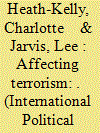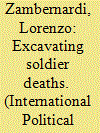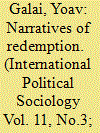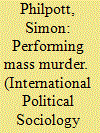|
|
|
Sort Order |
|
|
|
Items / Page
|
|
|
|
|
|
|
| Srl | Item |
| 1 |
ID:
155144


|
|
|
|
|
| Summary/Abstract |
The contemporary fascination with terrorism in Anglo-American popular culture, political discourse, news reportage, and beyond is boundless and well documented. In this article, we explore contemporary productions of terrorism as the outcome of three drives to knowledge: laugher, lamentation, and detestation. Drawing on a range of social and cultural practices—including jokes, street art, film, memorial projects, elite rhetoric, and abuse scandals—we make two arguments. First, that humor, grief, and hatred underpin and saturate the contemporary desire to know terrorism. And, second, that—although these drives function in multiple and ambiguous ways—they serve to institute a distance between the subject and object of terrorism knowledge, not least by encouraging us to laugh at those punished for terrorism, mourn for those lost in attacks, and direct our hatred toward those responsible. This analysis not only opens fresh insight into the workings of terrorism discourse in the post-9/11 period, it also points to connections between contemporary “critical” work on terrorism and debate on the role of emotions and affect in international politics more broadly.
|
|
|
|
|
|
|
|
|
|
|
|
|
|
|
|
| 2 |
ID:
155147


|
|
|
|
|
| Summary/Abstract |
This study argues that warfare is permeated by attitudes toward death, and that the history of war is also a history of these changing attitudes. By focusing on body disposal and burial practices, the article traces when and how soldiers—once regarded as simple military instruments—started to be conceived as individuals qua individuals, eventually becoming the hardly expendable beings that we know today. Although a focus on disposal and burial practices might sound fanciful, how corpses are dealt with can suggest whether, and in what ways, individuals are important to the living. It can also shed light on the origins of a variety of current phenomena, such as casualty sensitivity, post-heroic warfare, and risk-transfer militarism.
|
|
|
|
|
|
|
|
|
|
|
|
|
|
|
|
| 3 |
ID:
155148


|
|
|
|
|
| Summary/Abstract |
This paper provides a detailed study of the liquid bomb plot from 2006, focusing on the ways in which the plot was constituted as “an event unlike others” (Adey, Anderson, and Lobo Guerrero 2011, 340). Engaging with a critical body of scholarship that examines how events are assembled and governed as emergencies, disasters, or catastrophes, the paper explores two sets of questions. First, the paper engages with the temporal dimension of the event, asking how the liquid bomb plot was mediated as a particularly risky event that required immediate action. Second, the paper focuses on the spatial dimension of the event and asks how the plot also threatened a seemingly interconnected system of global airline movements and a mobile form of life. Drawing on Cowen’s (2010) analysis of the “seam space,” I am particularly interested in developments of reform and experimentation at the airport and in how newly emerging technologies are targeted at keeping airports both secure and open. Ultimately, by examining the liquid bomb plot “in the middle of events” (Barry 2006, 244), the paper goes beyond an understanding of the security event as something that happens abruptly and by surprise, and sheds light on the ongoing work that is involved in constituting and governing events.
|
|
|
|
|
|
|
|
|
|
|
|
|
|
|
|
| 4 |
ID:
155143


|
|
|
|
|
| Summary/Abstract |
In recent years, revisionist readings of midcentury realists have permitted accommodation with research traditions typically at odds with realist sensibilities, including constructivist approaches and critical theories of International Relations (IR). In this essay, I amplify this literature, arguing that there are unexpected resonances to be found between realist and postcolonial thinking. Specifically, I show how a spiritual affinity to difference is embedded in a shared critique of liberal ways of violence and conceptions of history. In order to make these connections, I first outline a particular strategy of argumentation, one that substantially differs from the extant revisionist literature. Foregrounding an anti-imperial politics, I reflexively consider this argument as a political practice to confront the contemporary dominance of liberal imperial formations. As such, I theoretically work on the contingent connections between realist and postcolonial lines of thought neither to establish a synthetic analytical framework nor to show how classical realists were proto-postcolonial theorists, but rather to make a “counter-imperial machine,” to produce a political alliance that draws minor traditions in realism toward postcolonial critiques of liberal imperialism.
|
|
|
|
|
|
|
|
|
|
|
|
|
|
|
|
| 5 |
ID:
155146


|
|
|
|
|
| Summary/Abstract |
A political project will be considered legitimate if the narrative that frames it is. This article explores the legitimizing function of narratives as well as the ways in which the narrative form can travel across borders, contexts, and discourses. The new, afforested landscape of Israel is the result of an intensive campaign of planting almost a quarter of a billion trees. Forests often cover the remains of Palestinian villages, demolished after they were abandoned in 1948. Nevertheless, through the work of narrative, the afforested landscape is instilled with a sense of the recovery of an imagined biblical landscape associated with ancient Jewish ownership of the land. This basic narrative of “redemption” has been carried over to frame new forests that similarly overwrite land claims by indigenous inhabitants. However, the new forests are presented as celebrations of international cooperation by involving foreign actors. Nevertheless, as I shall demonstrate, the particular designations of these forests, which are international in nature, still comply with a basic narrative of “redemption.”
|
|
|
|
|
|
|
|
|
|
|
|
|
|
|
|
| 6 |
ID:
155145


|
|
|
|
|
| Summary/Abstract |
The massacre, torture, persecution, and imprisonment of real and imagined communists and sympathizers in mid-1960s Indonesia was among the greatest state-sponsored atrocities of the twentieth century and yet remains little known and even less understood outside Indonesia. An elaborate mythology about the supposed communist coup attempt of September 1965 was foundational to the military government’s legitimacy discourses. The dead, the tortured, and the imprisoned remained an existential threat to Indonesia’s survival according to these discourses, and yet they could not be spoken of, or acknowledged without fear of retribution from the state. This article explores one attempt to break the silence surrounding the massacres and to make visible the suffering of millions of Indonesians; it does so through an analysis of the documentary film, The Act of Killing, in which a number of those involved in mass murder re-enact their killings. It explores the contribution of the film to understanding the politics of mass murder through an interrogation of the history it purports to address and through the methods employed by filmmaker Joshua Oppenheimer. It concludes that while the film is a singular achievement, it fails as a political intervention aimed at deepening understanding of the mass killings.
|
|
|
|
|
|
|
|
|
|
|
|
|
|
|
|
|
|
|
|
|